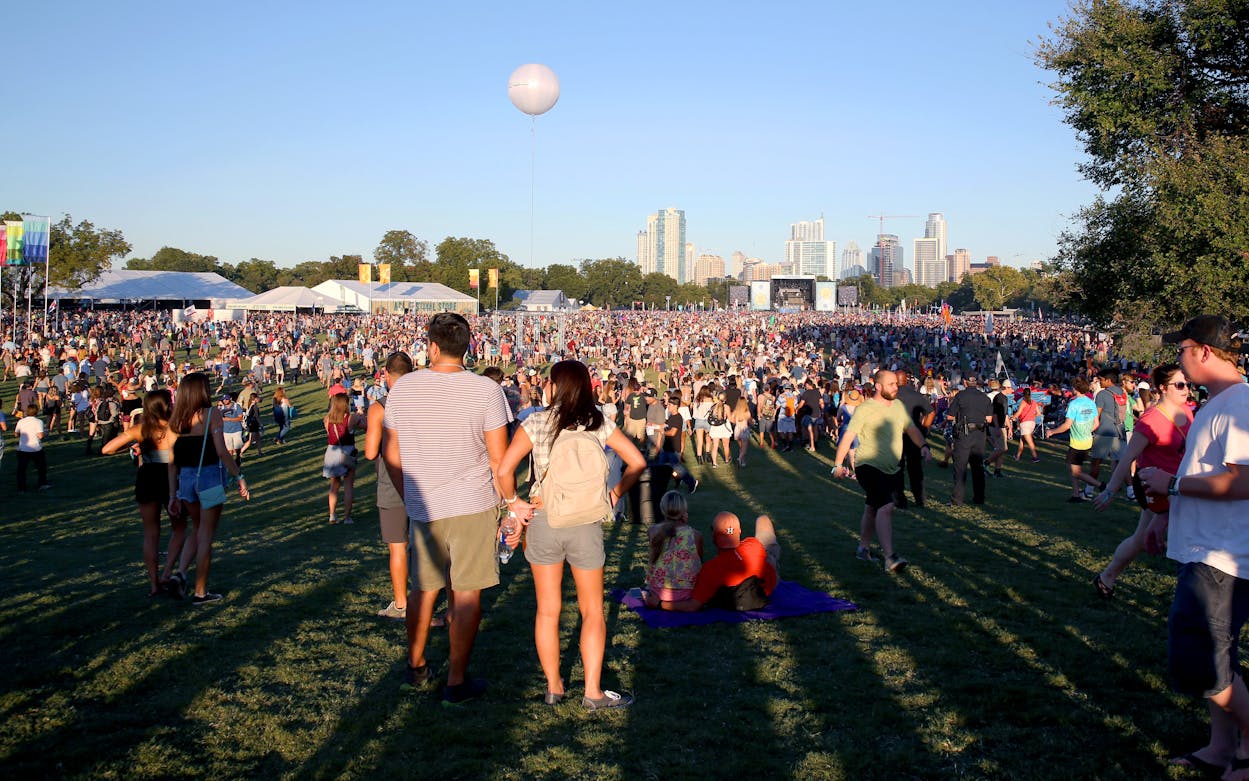For years, Austin City Limits Music Festival has been whiter and more male-dominated than most of its counterparts. It didn’t book its first hip-hop artist as a headliner until its eighth year, when M.I.A. crowned the fest in 2009. In the storied eighteen years of ACL lineups, there have been few female (or female-fronted) acts to close out any given night on an ACL main stage: only Bjork, the Yeah Yeah Yeahs, M.I.A., and Florence & the Machine (who was only booked for one of the two weekends in 2015). Alison Krauss appeared with Robert Plant in 2008, and the XX—which features both a male and female vocalist—played a late-night set last year. Beyond that, though, for the better part of two decades, ACL has filled its two nightly headlining spots with men.
The 2018 lineup, which was announced on Tuesday morning, reflects the festival’s newfound commitment to booking hip-hop artists at the top of the bill: Houston’s Travis Scott and Atlanta-rapper-turned-freakout-soul-act Childish Gambino will each close out a night. They’ll be joined by a handful of crowd-pleasers: Sir Paul McCartney, Metallica, the Arctic Monkeys, and EDM act Odesza. The top of the undercard is similarly impressive, with the National, Khalid, Hozier, David Byrne, CHVRCHES, Justice, and St. Vincent playing both weekends, and Shawn Mendes, Camila Cabello, and the Deftones trading slots on weekend one and weekend two. But two thirds of that list is made up of white men. And the homogeneity continues as you go down the lineup: of the 48 names listed on the first 11 lines of the poster—the classic festival denotation of hierarchy—only 15 are female or female-fronted artists. Artists of color, of any gender, are similarly underrepresented. (Women of color particularly—in those first 11 lines, there’s Cabello, Janelle Monáe, Tinashe, Houston rockers Khruangbin, and Wendy & Lisa of The Revolution.)
The mostly-male, mostly-white approach to booking isn’t exclusive to ACL (the Coachella 2015 poster looks sparse with all of the male artists removed), but the top of the 2018 ACL bill features fewer women than most of this year’s other headliner lineups. Florence & the Machine and Janet Jackson sit at the top of San Francisco’s Outside Lands lineup. For New York’s Governor’s Ball, the Yeah Yeah Yeahs and Halsey get billing on the second line of the poster. New Orleans’s JazzFest has Aretha Franklin atop the bill, and its Essence Fest features Erykah Badu and Jill Scott, Mary J. Blige, and Janet Jackson as headliners. The final night of Chicago’s Pitchfork Festival features Ms. Lauryn Hill and Chaka Khan. LA’s FYF Fest gets Janet Jackson and Florence & the Machine (both staying busy!) as its day one and day two headliners. There’s no shortage of women playing festivals in 2018, yet they only make up one third of the ACL bill. Even as ACL delivers on its commitment to genre diversity, it still leaves women and artists of color on the fringes.
This comes at a time when the male-dominated nature of music festivals has made headlines. After Coachella, Teen Vogue published a story by reporter Vera Papisova, who highlighted that all 54 women she interviewed at the festival claimed to have experienced some form of sexual harassment, and that she herself was groped 22 times. ACL has a stated anti-harassment policy, which does help it stand out from other festivals (there’s currently a petition urging the promoters of Outside Lands and Governor’s Ball to do the same), but even that is far from a foolproof safeguard. The policy puts the onus on women who experience harassment or assault to report it, with the added challenge of identifying someone in a crowd and finding someone affiliated with the festival to track that person down and enforce consequences. With that in mind, it might be useful if the men at festivals like ACL had more opportunities to see women not just as bodies around them but as the stars of the show. At the very least, in a concert culture where 90 percent of women say they’ve experienced harassment at shows, giving women equal time on the stage—in all time slots—certainly couldn’t make things worse.
- More About:
- Music
- Austin City Limits








